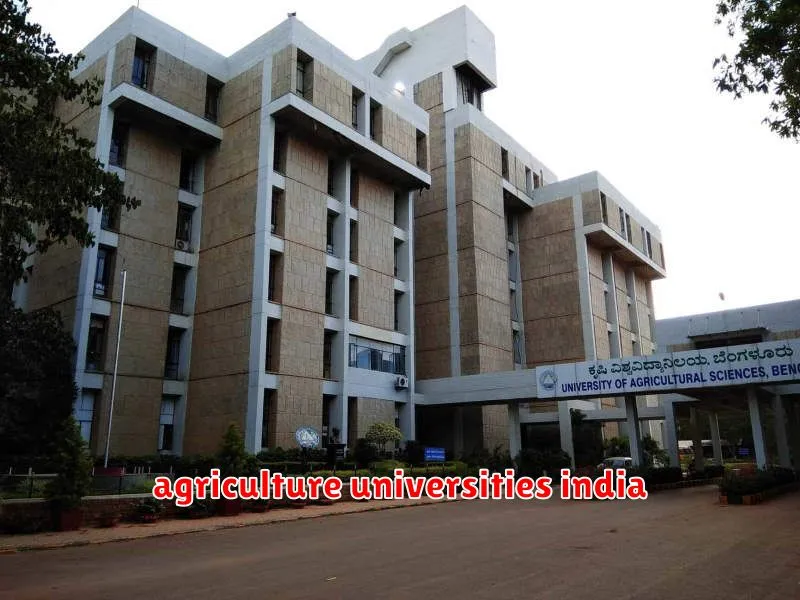Are you passionate about sustainable agriculture and environmental science and dreaming of a career that helps build a greener future? India boasts some incredible universities leading the charge in these crucial fields. This article dives into the top agriculture and environmental science universities in India, exploring their renowned programs, cutting-edge research, and contributions to a more sustainable tomorrow. Discover where you can gain the best education and make a real difference in the fight for a healthier planet. Prepare to explore the institutions shaping the future of agricultural technology and environmental conservation in India!
Indian Agricultural Research Institute
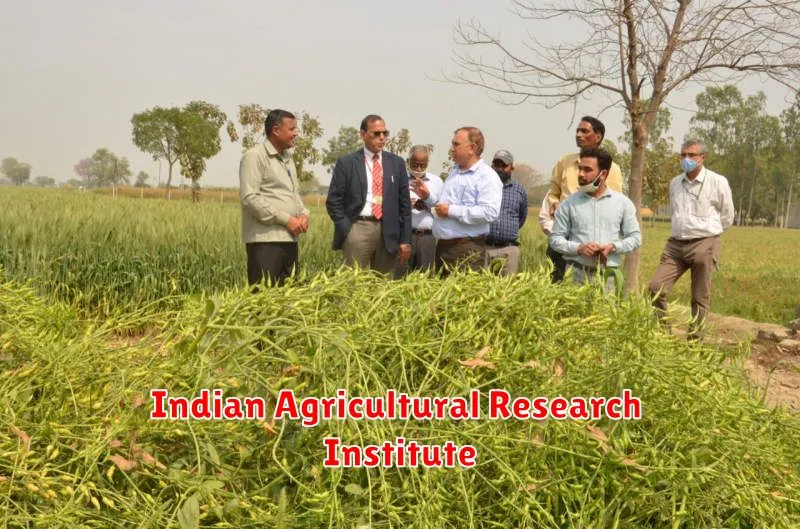
The Indian Agricultural Research Institute (IARI), located in Pusa, New Delhi, is a premier agricultural research and education institution in India. Established in 1905, IARI plays a vital role in developing high-yielding and climate-resilient crop varieties. Its research contributes significantly to India’s food security and sustainable agriculture practices.
IARI boasts a strong faculty and state-of-the-art infrastructure, facilitating cutting-edge research in various areas including crop improvement, soil science, agricultural entomology, and plant pathology. The institute is actively involved in developing sustainable farming techniques, promoting biodiversity, and mitigating the impact of climate change on agriculture.
Furthermore, IARI offers a range of undergraduate and postgraduate programs in agricultural sciences, attracting students from across India and internationally. Its graduates play crucial roles in agricultural research, extension services, and policy-making, contributing to a greener and more sustainable agricultural future for India.
IARI’s commitment to research and education makes it a vital contributor to India’s journey towards sustainable and environmentally conscious agriculture, ensuring food security for a growing population while preserving the environment.
Tamil Nadu Agricultural University
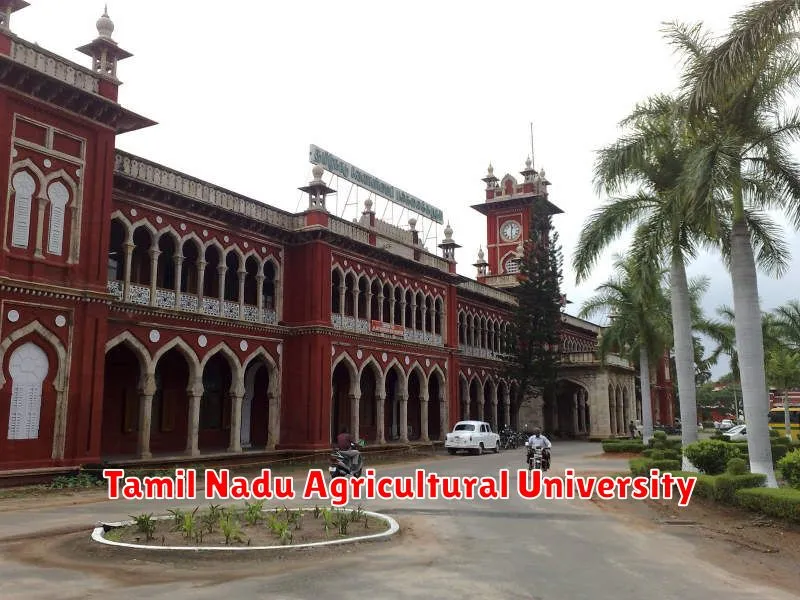
The Tamil Nadu Agricultural University (TNAU) stands as a leading institution in India for agricultural education and research. Established in 1971, TNAU plays a crucial role in driving agricultural advancements and promoting sustainable practices within the state and beyond.
TNAU offers a wide range of undergraduate and postgraduate programs focusing on various aspects of agriculture, including crop science, horticulture, soil science, agricultural engineering, and agricultural economics. Their curriculum emphasizes practical training and hands-on experience, equipping students with the necessary skills for successful careers in the field.
Beyond its academic pursuits, TNAU actively engages in research and development, focusing on issues pertinent to Indian agriculture, such as climate change adaptation, water conservation, and improved crop yields. Their contributions to sustainable agricultural practices are significant, promoting a greener future for the nation.
The university’s strong emphasis on extension services ensures that its research findings and technological innovations reach farmers across the region, leading to improved livelihoods and increased agricultural productivity. This focus on practical application distinguishes TNAU as a vital contributor to India’s agricultural landscape.
Graduates from TNAU are highly sought after by various organizations, both within India and internationally, signifying the quality of education and training provided. The university continues to be a key player in shaping India’s agricultural future through its commitment to research, education, and extension.
Punjab Agricultural University
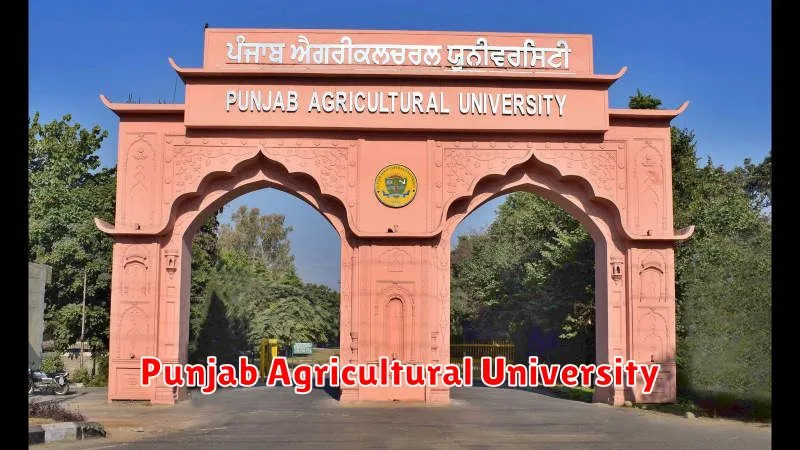
Punjab Agricultural University (PAU), located in Ludhiana, Punjab, is a leading institution in India for agricultural education and research. Established in 1962, PAU has played a pivotal role in the Green Revolution, contributing significantly to India’s agricultural advancements.
The university offers a wide range of undergraduate and postgraduate programs in various agricultural and environmental science disciplines. Its strong focus on sustainable agriculture and environmentally friendly practices makes it a key player in promoting a greener future. Research initiatives at PAU cover diverse areas including crop improvement, soil science, agricultural engineering, and environmental conservation.
PAU’s commitment to extension services ensures that its research findings reach farmers, empowering them with knowledge and technologies for improved agricultural practices and resource management. This hands-on approach contributes directly to sustainable agricultural development in the region and beyond.
Graduates from PAU are highly sought after by both the public and private sectors, reflecting the university’s reputation for producing skilled and knowledgeable professionals in the field of agriculture and environmental science. Its contribution to India’s food security and its commitment to environmental sustainability solidify PAU’s position as a leading institution shaping a greener future for the nation.
G.B. Pant University of Agriculture and Technology
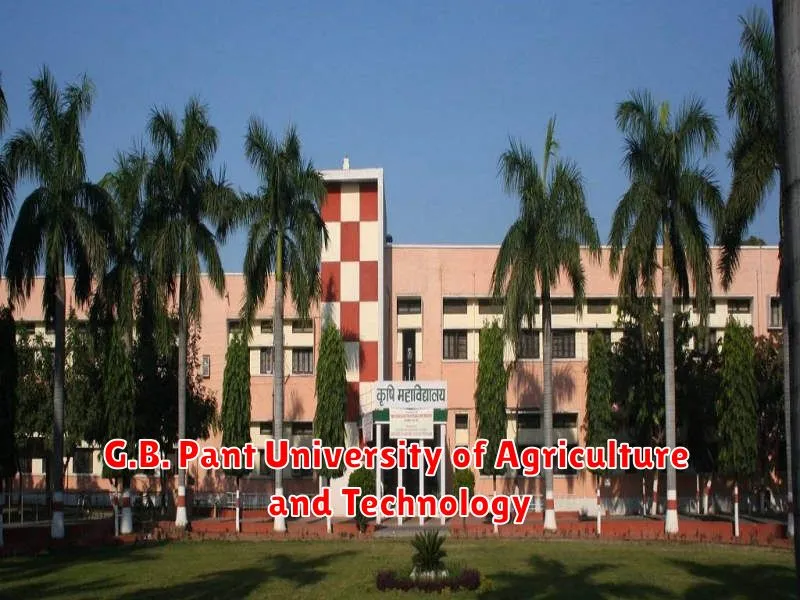
Located in Pantnagar, Uttarakhand, G.B. Pant University of Agriculture and Technology (GBPUAT) is a pioneering institution in agricultural and environmental sciences in India. Established in 1960, it boasts a strong reputation for its research and teaching in various disciplines, including agriculture, horticulture, forestry, and veterinary science.
The university offers a wide range of undergraduate and postgraduate programs, attracting students from across India and beyond. Its commitment to sustainable agriculture and environmental protection is evident in its curriculum, which integrates principles of ecological balance and resource management.
GBPUAT’s research contributions are significant, focusing on areas like climate-smart agriculture, water conservation, and biodiversity conservation. The university’s strong network of collaborations with national and international institutions further strengthens its impact on agricultural development and environmental sustainability in India.
Graduates of GBPUAT are well-equipped to tackle the challenges facing agriculture and the environment, making it a vital contributor to India’s pursuit of a greener future. The university’s emphasis on practical training and hands-on experience ensures its students are prepared for successful careers in diverse fields.
Acharya N.G. Ranga Agricultural University
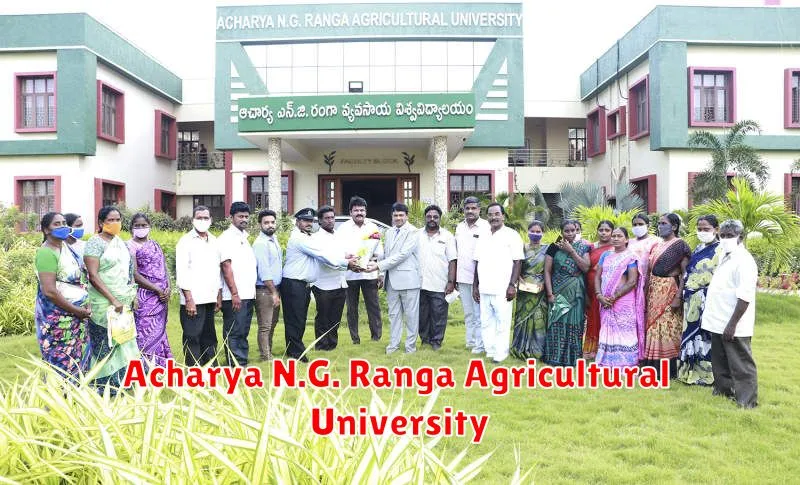
Acharya N.G. Ranga Agricultural University (ANGRAU), located in Andhra Pradesh, India, is a prominent institution contributing significantly to agricultural education and research. It plays a crucial role in fostering sustainable agricultural practices and environmental stewardship.
ANGRAU offers a wide range of undergraduate and postgraduate programs in various agricultural and environmental sciences. These programs equip students with the necessary skills and knowledge to address the challenges faced by the agricultural sector, promoting environmentally conscious farming techniques.
The university’s research focus includes areas like crop improvement, soil science, water management, and sustainable agriculture. This research directly impacts the development of environmentally friendly farming methods and contributes to a greener future for India’s agricultural landscape.
Furthermore, ANGRAU actively engages in extension activities, disseminating knowledge and best practices to farmers across the region. This outreach program helps improve agricultural productivity while minimizing environmental impact. The university’s commitment to practical application of research makes it a key player in building a more sustainable agricultural system.
In conclusion, ANGRAU’s dedication to education, research, and extension services makes it a valuable asset in the pursuit of a greener future for India, contributing substantially to sustainable agriculture and environmental science.
University of Agricultural Sciences, Bangalore
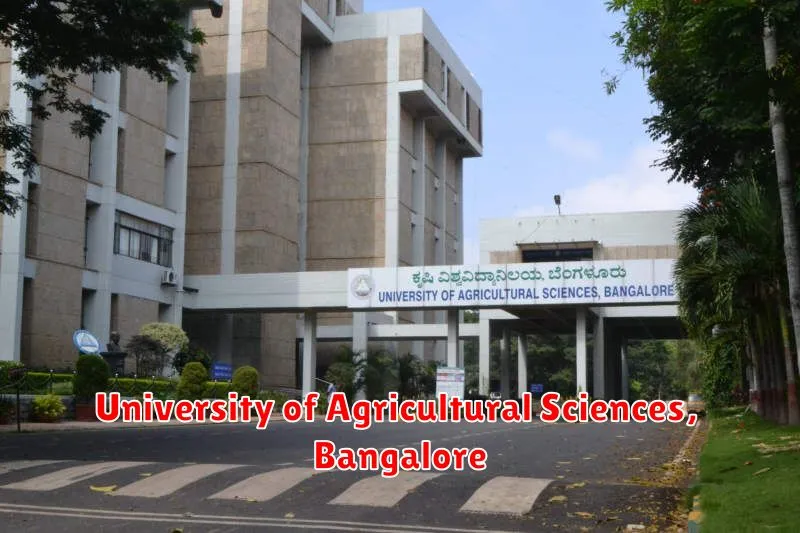
The University of Agricultural Sciences, Bangalore (UAS-B) stands as a prominent institution in India, significantly contributing to agricultural advancements and environmental sustainability. Established in 1964, UAS-B offers a wide array of undergraduate and postgraduate programs in various agricultural and environmental sciences. Its focus on research and development is crucial, addressing critical issues like sustainable agriculture, climate-resilient farming, and conservation of natural resources.
The university boasts a strong faculty dedicated to both teaching and research, producing numerous publications and innovations. Research collaborations with national and international institutions further strengthen its impact. UAS-B’s commitment to practical training and hands-on experience equips graduates with the skills needed to tackle the challenges of a changing environment. Graduates from UAS-B are well-placed to contribute to a greener future in India and beyond, making it a leading choice for students pursuing a career in agriculture and environmental science.
The university’s extensive network of research farms and experimental stations provides a practical learning environment for students. This allows them to gain valuable experience applying theoretical knowledge to real-world scenarios, fostering innovation and developing solutions for improving agricultural practices and protecting the environment. UAS-B’s legacy and continued focus on sustainable agricultural practices firmly cement its position as a key player in shaping a greener future for India.
Indira Gandhi Krishi Vishwavidyalaya
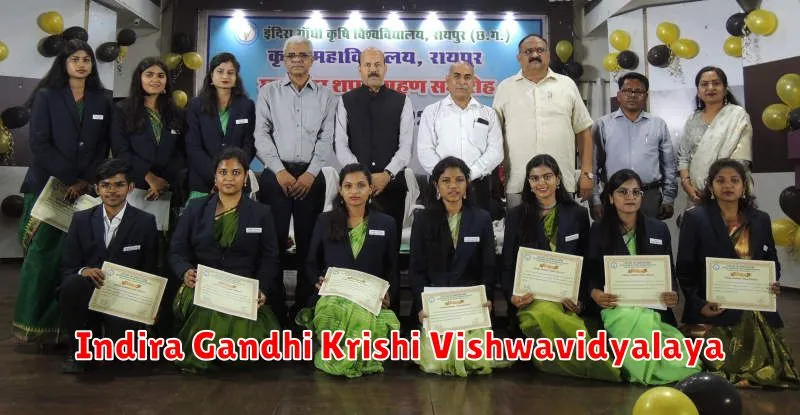
Indira Gandhi Krishi Vishwavidyalaya (IGKV), located in Raipur, Chhattisgarh, is a prominent agricultural university in India playing a crucial role in fostering a greener future. It offers a wide range of undergraduate and postgraduate programs in agriculture, horticulture, animal husbandry, and environmental science.
IGKV is known for its focus on sustainable agriculture practices, incorporating research and education on organic farming, water conservation, and climate-resilient agriculture. The university actively engages in extension activities, transferring knowledge and technology to farmers across the region, thereby contributing to improved agricultural productivity and environmental stewardship.
Its commitment to environmental science is evident through its dedicated departments and research initiatives focusing on issues like biodiversity conservation, soil health management, and pollution control. Graduates from IGKV are equipped with the skills and knowledge necessary to address the multifaceted challenges facing Indian agriculture and the environment.
The university’s contributions extend beyond academic pursuits. Its research findings and technological advancements directly benefit farmers and contribute to the overall development of the agricultural sector in Chhattisgarh and beyond, promoting a more sustainable and environmentally responsible approach to food production.
Chaudhary Charan Singh Haryana Agricultural University
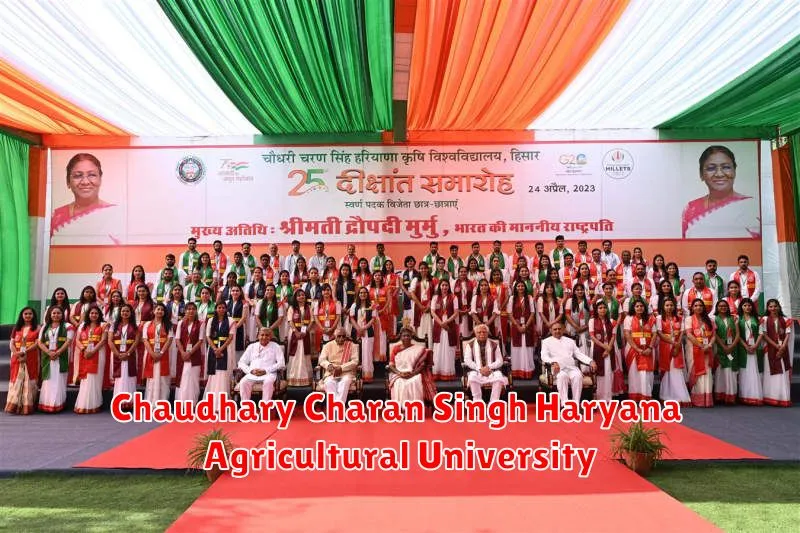
Chaudhary Charan Singh Haryana Agricultural University (CCSHAU), located in Hisar, Haryana, is a leading agricultural university in India playing a vital role in shaping a greener future. Established in 1970, CCSHAU offers a wide range of undergraduate and postgraduate programs in agriculture, horticulture, animal sciences, and environmental science.
The university’s commitment to sustainable agriculture is evident in its research and teaching initiatives. It focuses on developing environmentally friendly farming practices, promoting water conservation techniques, and exploring alternative energy sources for agricultural applications. CCSHAU also actively participates in extension services, transferring knowledge and technology to farmers across the region, empowering them to adopt sustainable methods.
Research at CCSHAU is geared towards addressing critical issues like climate change resilience, biodiversity conservation, and soil health management. Its dedicated faculty and researchers are at the forefront of innovation, developing climate-smart agricultural technologies and promoting sustainable resource management. The university’s strong industry collaborations ensure that research findings are effectively translated into practical applications.
Graduates from CCSHAU are highly sought after by both the public and private sectors, contributing significantly to the advancement of agriculture and environmental science in India. Its strong emphasis on practical training and hands-on experience equips students with the necessary skills to become future leaders in the field, driving positive change towards a sustainable and environmentally conscious agricultural sector.

